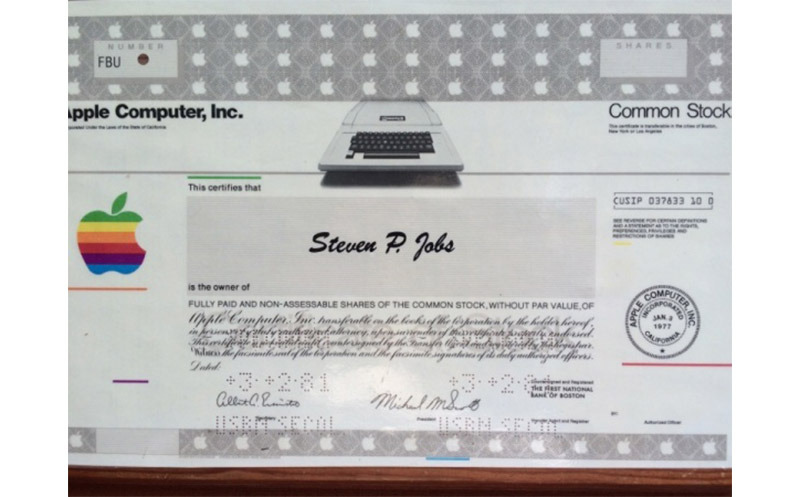An Apple stock certificate thought to be the first awarded to company cofounder Steve Jobs, and later recovered from a trash heap, is being sold by an autograph and rare documents dealer for $195,000.
On sale now at Moments in Time, the certificate appears to have been issued to Jobs shortly after Apple went public in 1980, as evidenced by a 1981 date perforated into the document, reports Silicon Beat.
According to Moments in Time's Gary Zimet, the common stock certificate hung on Jobs' office wall in Cupertino, Calif., until 1985. At the time, then-CEO John Sculley — brought in to run Apple in 1983 — famously helped force Jobs out of the company.
As told by Zimet, shortly after the ouster in 1985, Sculley called for Jobs' office to be cleared out. The certificate on sale today was dumped in the trash along with other paraphernalia, but an industrious employee recovered the document and kept it for 31 years.
After a series of missteps that nearly bankrupted Apple, Jobs was ultimately brought back into the fold through the 1997 acquisition of NeXT. Once again at the helm of the company he cofounded, Jobs cultivated development of a series of popular products like iMac, iPhone and iPad, leading Apple to become the world's most valuable company.
In giving up the important piece of Apple lore, the unnamed employee has provided a notarized letter attesting to the document's authenticity, the publication said. Beyond the letter, there is little else to corroborate Zimet's story.
Apple artifacts, especially items linked to Jobs, often sell for sky-high prices. In 2011, a batch of documents that included an original founding document signed by Jobs, Steve Wozniak and Ronald Wayne sold for $1.6 million. Zimet priced the stock certificate at $195,000 based in part on those previous sales.
 AppleInsider Staff
AppleInsider Staff







 Charles Martin
Charles Martin


 Wesley Hilliard
Wesley Hilliard
 Stephen Silver
Stephen Silver
 William Gallagher
William Gallagher

 Marko Zivkovic
Marko Zivkovic









14 Comments
I'm curious - does anybody here know what this would be worth (if it were still valid) at the current stock price with the various stock splits over the years?
****
Oh, split 4 times, 2, 2, 2, 7. So 56x
So, $6300ish
I stopped reading at the end of Para 4. The only thought in my mind was: Sculley was a third-rate, despicable jerk with no remote concept of his brush with greatness. What a loser. The only reason he won't end up on the trash heap of history is because his name is associated with Steve Jobs.
As soon as I saw the headline I thought of my brief essay on minimalism. It applies, I think. Recommended reading for anyone contemplating spending a couple hundred grand on a stock certificate.
----